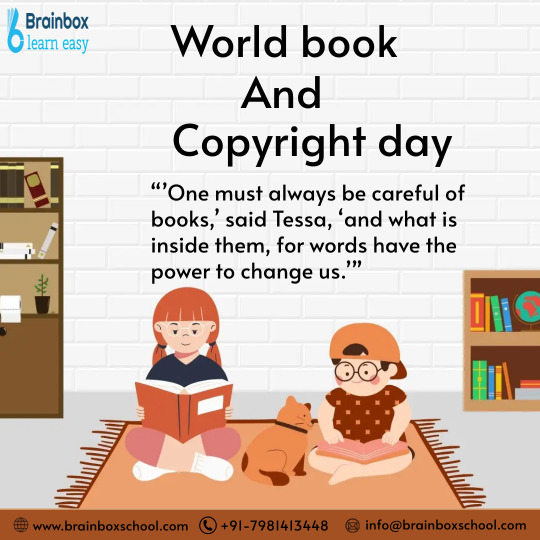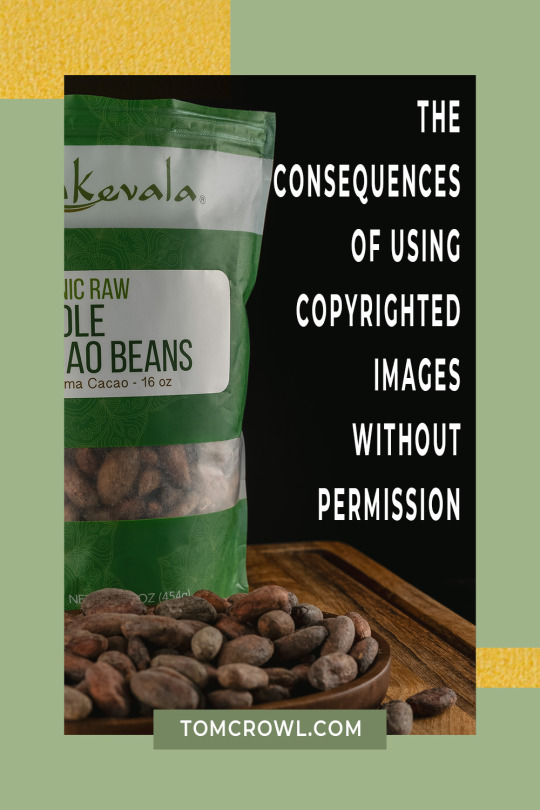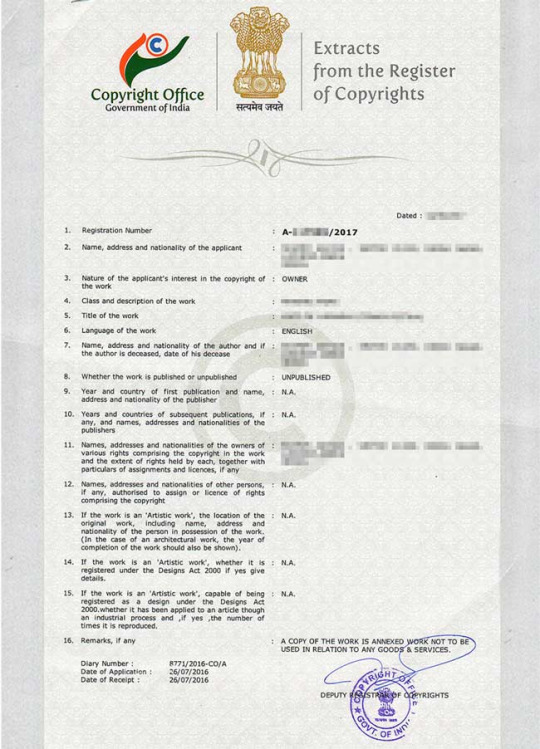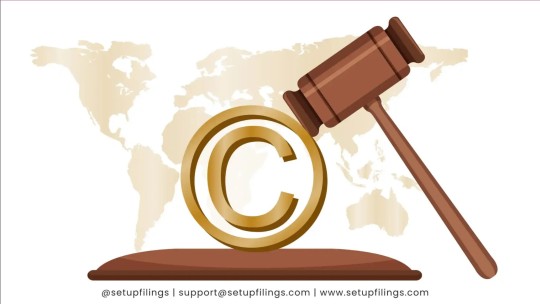#CopyrightAwareness
Explore tagged Tumblr posts
Text

Create. ✨ Copyright. ©️ Celebrate. 🎉 Repeat! 🔁 Emphasizes the importance of protecting creativity 🎨 and intellectual property 📚 in a world driven by innovation 🌍. It highlights the journey of creating original work 🖌️, securing copyrights to safeguard ownership 🔒, celebrating unique contributions 🥳, and repeating the process to inspire growth 🌱 and progress 🚀. This mantra serves as a reminder to value originality 💡 and ensure ethical practices ✅ in art 🎭, technology 💻, and beyond. 🌟"
Contact Us DC: +1 (202) 666-8377 MD: +1 (240) 477-6361 FL +1 (239) 292–6789 Website: https://www.ipconsultinggroups.com/ Mail: [email protected] Headquarters: 9009 Shady Grove Ct. Gaithersburg, MD 20877 Branch Office: 7734 16th St, NW Washington DC 20012 Branch Office: Vanderbilt Dr, Bonita Spring, FL 34134
#ipconsultinggroup#CreateCopyrightCelebrate#IntellectualProperty#ProtectCreativity#InnovationMatters#OriginalityCounts#CelebrateArt#EthicalPractices#InspireProgress#CopyrightAwareness#CreativeJourney#InnovationEthics#SafeguardIdeas#CreativeRights#ArtAndTech#CelebrateOriginality
0 notes
Text

📚✨ Happy World Book and Copyright Day! 📚✨ Today, we celebrate the magical world of books and the importance of protecting the creativity behind them. 🎉📖
🌍 World Book and Copyright Day, designated by UNESCO, honors the timeless power of literature to inspire, educate, and unite us. From captivating stories to profound insights, books enrich our lives in countless ways. Let's celebrate the joy of reading and the beauty of storytelling today and every day! 📚❤️
🔒 Copyright plays a crucial role in safeguarding the rights of authors and creators, ensuring they receive recognition and fair compensation for their work. Let's raise awareness about the importance of respecting copyright laws and supporting the incredible talents behind our favorite books. 💡💼
Join us in celebrating #WorldBookDay and #CopyrightDay by sharing your love for reading, supporting authors, and championing the protection of intellectual property rights. Together, let's spread the magic of books and inspire a world where creativity thrives! 🌟📚
#WorldBookDay#CopyrightDay#BooksMatter#ReadMore#SupportAuthors#ProtectCopyrights#LiteraryCelebration#BookLovers#CopyrightAwareness#CelebrateReading
0 notes
Text

The Consequences of Using Copyrighted Images Without Permission
Venturing beyond licensing agreements can lead to legal repercussions. Delve into the importance of obtaining appropriate licenses for visual assets and the potential risks of copyright violations. A must-read for businesses and marketers.
1 note
·
View note
Text
Copyright Certificate in India at a glance
Copyright, a form of intellectual property law, protects original works of authorship including literary, dramatic, musical, and artistic works, such as poetry, novels, photographs, Paintings, a speech, movies, songs, source codes of software programs, the binary executable file, Website, Mobile App, and architecture.
Its registration with the IPR Authority essentially ensures that any creative work cannot be copied without the permission of the author or creator.
Benefits of Copyright Registration:
Legal Protection
Legal Action against others
Legal right Established
Holding rights since application filed
Right to use, Re-Use & Reproduce
Free to Create derivative work
Economic benefits
Enables moral rights
Gives economic stability

#CopyrightMatters#protectyourbrand#ProtectYourWork#copyright law#CreativeRights#fair use#ip rights#Copyright Infringement#copyright protection#respect copyright#original content#CopyrightAwareness#copyright issues#Copyright Compliance
0 notes
Text
The Importance of Song Copyright for Independent Artists
As an independent artist, your music is your livelihood. It’s important to protect your intellectual property and secure your rights to your songs. One way to do this is through song copyright.
Read The Article for Complete Information: https://setupfilings.com/learn/song-copyright-for-independent-artists/

#CopyrightProtection #IntellectualProperty #SongCopyright #OriginalMusic #ProtectYourArt #ArtistsRights #IndieArtist #MusicianLife #MusicCopyright #CreatorsRights #MusicLaw #IPProtection #CopyrightInfringement #Songwriting #Royalties #MusicBusiness #CopyrightLaw #CopyrightAwareness #CopyrightRegistration #MusicIndustry
0 notes
Text
More Legal Research
Regulation in the software and gaming industries
There are numerous legal and regulatory considerations which games and software developers need to bear in mind when developing their products, such as:
· intellectual property rights and licenses
· consumer protection
· age ratings and classification
· advertising laws
· data protection and privacy
· gambling legisation
· responsibilities concerning staff and employment practices
https://www.nibusinessinfo.co.uk/content/regulation-software-and-gaming-industries
Copyright
Copyright is legal right that protects the use of your work once your idea has been physically expressed. The current copyright legislation in the UK is the Copyright, Designs and Patents Act 1988.
How long is my work protected for?
The period your copyright work is protected for depends on a number of factors such as the type of work you have created and when it was made. For example, when you write a poem your work will be protected until 70 years after your death. But if you act in a play, any rights in your performance are protected for a period of 50 years.
The Copyright, Design and Patents Act 1988 gives you a longer period of protection than previous historic legislation. For information on the history of copyright click on Related Links.
https://www.bbc.co.uk/copyrightaware/what-is
0 notes
Text
What is copyright?
“Copyright is legal right that protects the use of your work once your idea has been physically expressed.“ - https://www.bbc.co.uk/copyrightaware/what-is
If you have a copyright on your work, this will layout rules as to how your work should be used. “With your copyrighted work you can copy, change or sell it, share it online or rent it to someone as well as prevent other people from doing those things.” To get a copyright on your work, it must be your own original work, created by your own skill and labour.

0 notes
Text
TB1- WEEK 11: BLOG 2 - Introduction to Film & Music Media Copyright
Throughout my course I’ve already written a handful of essays, be it formative or summative, it is all my intellectual properties. Intellectual properties, as defined by the United Kingdom government, is a piece of creative product physically produced by me, I would always own the rights to the piece of content as I’m it’s original content, and thus I have the decision to allow others to use it or not, it is all under my discretion (GOV.UK, 2018).
In order to protect intellectual properties, patents are created as part of a extensive system that allows inventors to sell their creations (British Library, 2018). While patents itself a process which might be time consuming, copyright protections are automatically present on the original content (BBC, 2018).
Of course it is great to know that thieves out there wouldn’t be able to use your content without acknowledging the author. Thus in order to utilise other’s intellectual property for commentary, parody work, criticism. or other proposes, a user could enact the idea of fair use. Fair use means that as long as the content creator utilise the content for purposes other than to gain something from the content that is not rightfully theirs, it is possible to utilise the content without gaining the permission from the original creator, thus protecting users from a copyright infringement (Stanford, 2018). It is worth noting that fair use is mostly a term used in the United States of America, different countries has it own set of laws and thus the terminology might be different, but the idea is still the same.
So why would I use a law from the United States as an example? Because the following case is from the United States itself.
youtube
(h3h3Productions, 2016)
In the lecture and seminar we talked about copyrights on films and musics, and we skimmed the surface of the topic of copyrights on videos and copyright abuse. The above video is from h3h3Productions, a comedy channel dedicated to criticising different events. To sum it all up, Matt Hosseinzadeh, the user on the other end of a criticism, sued h3h3Productions for copyright infringement due to h3h3Productions allegedly “stealing” Matt’s content even though they used Matt’s content for criticism. In the end the court ruled in favour of h3h3Productions as they are under the protection of fair use, thus h3h3Productions won the lawsuit. Through out the course of the lawsuit, it cost h3h3Productions a vast amount of money and time, luckily due to help from other major channels and donations from people, h3h3Productions were able to handle the lawsuit.
With this we could see that copyrighting is not joke, it could potentially cost someone their whole savings. Of course as technology advances, people are more and more aware of copyright laws and the general idea of intellectual properties. But still the question remains, will there be another “h3h3 incident” in the future as the entertainment fields expands? Especially when the users are slowly becoming the creators.
References:
BBC, 2018. What is Copyright?. [online] Available at: <http://www.bbc.co.uk/copyrightaware/what-is> [Accessed 17 March 2018]
British Library, 2018. What is a patent?. [online] Available at: <https://www.bl.uk/business-and-ip-centre/articles/what-is-a-patent> [Accessed 17 March 2018]
GOV.UK, 2018. Intellectual property and your work. [online] Available at: <https://www.gov.uk/intellectual-property-an-overview> [Accessed 17 March 2018]
h3h3Productions, 2016. We're Being Sued. [video online] Available at: <https://www.youtube.com/watch?v=fEGVOysbC8w> [Accessed 17 March 2018]
0 notes
Text
Copyright
Copyright is a legal right that protects the use of your work once your idea has been physically expressed. The current copyright legislation in the UK is the Copyright, Designs and Patents Act 1988.
What kind of work can be protected?
Some examples of work that can be protected by copyright are videos, blogs, original literary, dramatic, musical and artistic work, including illustration and photography, original non-literary written work, such as software, web content and databases, sound and music recordings, film and television recordings, broadcasts and the layout of published editions of written, dramatic and musical works.
How copyright protects your work
Copyright prevents people from:
copying your work
distributing copies of it, whether free of charge or for sale
renting or lending copies of your work
performing, showing or playing your work in public
making an adaptation of your work
putting it on the internet
How long copyright lasts?
Copyright protection starts as soon as a work is created. Once your copyright has expired, anyone can use or copy your work.
The length of copyright depends on the type of work.
How long copyright usually lasts
Written, dramatic, musical and artistic work 70 years after the author’s death
Sound and music recording 70 years from when it’s first published
Films 70 years after the death of the director, screenplay author and composer
Broadcasts 50 years from when it’s first broadcast
Layout of published editions of written, dramatic or musical works 25 years from when it’s first published
The length of copyright also depends on how long ago the work was created.
What can you do if you find somebody has copied your work ?
Infringement of copyright occurs when someone takes either all of your work, or a substantial part of it, without permission. However, there are several exceptions which allow a copyright work to be used without permission.
If someone has infringed your copyright you could contact them directly, consider mediation, or seek legal advice. If you decide to take legal action, there are a number of remedies that you can seek from the court.
The infringer can give a promise, known as an undertaking, that they will license the work from you, under terms that you agree.
The court can grant an injunction. This means that the judge will make an order to stop the person from using your work. This could also mean having your work returned to you or seizure of any infringing copies.
The court may also award damages. This may be with an order for damages; to restore you back into the position that you would have been in if the infringement had not occurred. Or it may be an account for profits; where the profits gained by the infringer are assigned to the original copyright owner.
Action against copyright infringement can be taken by the copyright holder or someone who has full licence of the work. It is also possible to take action against infringement of moral rights. So, even if you have sold your copyright to a publisher, for example, you can still assert your moral rights, such as objecting to derogatory treatment of your work. The court may grant an injunction to stop the person doing the derogatory act against your work.
https://www.gov.uk/copyright/overview
http://www.bbc.co.uk/copyrightaware/what-is
http://copyrightuser.org/topics/faqs/
How you could lose copyright of your work?
1. Sell or transfer your copyright
If you sell or transfer your copyright to someone else, they now own the copyright. If you only license the work to them, then you retain the original copyright — they just get the right to use it according to the terms of license agreement.
The transfer of copyright takes place via a signed contract by the actual person who originally created the work or their authorized agent. In other words, if someone’s avatar tells you, “You can have the copyright to my work,” get it in writing. Otherwise, it’s not legally binding, and they can go after you later for infringing.
Similarly, if a Second Life creator says, “I give up, I’m sick of all this infringement. Do what you want. I hope you choke on it, you lousy hackers!” they’re not actually giving up their copyright. They’re just expressing their personal dissatisfaction. They can change their mind at any time, come back, and start suing people. Now, those other people may argue that “Do what you want” implied a license to use the work. It would be up to the courts to decide.
2. Sign a “work for hire” agreement
When you work for a company — or are a freelancer who signed a “work for hire” agreement — everything you create belongs to the company.
Again, this agreement must be legally signed. If it’s an avatar who says, “I’ll build this for you, and you have all the rights to it,” ask for a written, legal agreement signed by the actual person or their legal representative. Even Miley Cyrus signed her contracts with the name “Destiny Hope Cyrus” — until she legally changed it in 2008.
So unless your builder is actually, legally called “Flowerchild Elvenwhisperer” — which does happen — ask for their legal name on the work for hire contract.
3. Die and wait 70 years.
There’s one last way to lose your copyright. You can die, and then sit around and wait for 70 years. During that time, your heirs will get to enjoy your copyright. Though you probably won’t.
Actually, the length of time varies based on the country you’re in, whether you created the work as an employee of a corporation, or whether the work was created before or after 1978, among other factors.
So go ahead and take reasonable steps to protect your work. File DMCA notices against infringers. And don’t let the jackals get you down. Even if you can’t get them today, that doesn’t mean you can’t go after them tomorrow.
Losing a trademark
What you can lose, if it gets into common use, is your trademark.
This has happened to aspirin, escalator, butterscotch, zipper, yo-yo, thermos, and heroin.
Companies like Xerox, Google, and LEGO fight hard to avoid having their words become generic synonyms for “photocopy,” “search” and “building block.” They do it by reminding journalists and everyone else not to use the words generically, and trying to convince dictionary creators and trademark authorities that this hasn’t already happened.
http://www.hypergridbusiness.com/2011/08/how-to-lose-your-copyright-in-three-easy-steps/
0 notes
Text

🎯 Copyrights secure your creativity in a competitive world.
Copyrights play a crucial role in safeguarding your creative efforts in an increasingly competitive world. They grant creators exclusive rights to their original works, whether in literature, art, music, or digital content, ensuring that others cannot use or reproduce their creations without permission. By establishing ownership, copyrights provide both legal protection and recognition, encouraging innovation and fair competition. Understanding the importance of copyrights helps creators secure their intellectual property and thrive in their respective fields.
Contact Us DC: +1 (202) 666-8377 MD: +1 (240) 477-6361 FL +1 (239) 292–6789 Website: https://www.ipconsultinggroups.com/ Mail: [email protected] Headquarters: 9009 Shady Grove Ct. Gaithersburg, MD 20877 Branch Office: 7734 16th St, NW Washington DC 20012 Branch Office: Vanderbilt Dr, Bonita Spring, FL 34134
#ipconsultinggroup#CopyrightProtection#IntellectualProperty#CreativeRights#ProtectYourWork#InnovationSecurity#IPRights#CreativeOwnership#ContentProtection#CompetitiveEdge#LegalRights#OriginalityMatters#CreativeSecurity#CopyrightAwareness#IdeasMatter#SecureYourCreativity
0 notes
Text
When is my work protected by Copyright?
For your work to be protected by copyright law it needs to be original and tangible.
Original For a work to be original it must be the product of your own skill and labour or intellectual creation and should not just replicate the work of someone else (such as imitating a drawing or a painting). This is to prevent simple things like writing a poem consisting of a single word being automatically protected by copyright. Otherwise, being creative in daily life would be impossible without stumbling into someone else's copyright.
Tangible This means that it can’t just be an idea you've had. Instead you need to have expressed that idea in a physical form. When you make up a tune in your head, it is only protected by copyright from the moment you write down the musical score or record a performance of it.
How do I copyright my work?
Copyright protection arises automatically as soon as your work is created. Unlike a patent or trademark, you don’t need to register your work to ensure your rights are protected by copyright.
Copyright however may not protect all forms of creativity, and in some cases a different form of Intellectual Property (IP) protection may be more suitable. You can find more information about the different forms of IP protection and what they do here.
How long is my work protected for?
The period your copyright work is protected for depends on a number of factors such as the type of work you have created and when it was made. For example, when you write a poem your work will be protected until 70 years after your death. But if you act in a play, any rights in your performance are protected for a period of 50 years.
The Copyright, Design and Patents Act 1988 gives you a longer period of protection than previous historic legislation. For information on the history of copyright click on Related Links.
Is my work protected outside the UK?
Each country has its own copyright law and copyright practice can vary, but most countries will protect works created in other countries in the same way that they protect their own citizens’ creations. Click on the Related Links for further resources.
http://www.bbc.co.uk/copyrightaware/what-is
0 notes
Text

🎯 Copyright infringement costs more than prevention. Protect your work today.
Copyright infringement can result in significant financial and legal costs, often far exceeding the investment in preventative measures. By taking steps to protect your creative work, such as registering copyrights, using licensing agreements, and monitoring usage, you can avoid the expense and complications that come with infringement. Safeguarding your intellectual property not only preserves your rights but also ensures that you can fully benefit from your work without the risk of unauthorized use. Protect your creations today before it’s too late.
Contact Us DC: +1 (202) 666-8377 MD: +1 (240) 477-6361 FL +1 (239) 292–6789 Website: https://www.ipconsultinggroups.com/ Mail: [email protected] Headquarters: 9009 Shady Grove Ct. Gaithersburg, MD 20877 Branch Office: 7734 16th St, NW Washington DC 20012 Branch Office: Vanderbilt Dr, Bonita Spring, FL 34134
#ipconsultinggroup#CopyrightProtection#IntellectualProperty#StopInfringement#ProtectYourWork#IPRights#LegalProtection#CopyrightMatters#CreativeRights#PreventInfringement#SecureYourContent#CopyrightAwareness
0 notes
Text
Copyright (Hak Cipta)
Copyright, atau yang kita kenal dalam bahasa Indonesia sebagai hak cipta, adalah hak hukum yang melindungi ide dan karya kita setelah diekspresikan secara fisik (ada bentuk fisiknya). Hukum mengenai hak cipta mengatur tentang hak yang dipunyai pemilik karya, termasuk kewajiban yang harus dilakukan oleh orang yang ingin memakai karya kita. Hak cipta dirancang sebagai hak yang terbatas lingkup dan durasi waktunya untuk memastikan bahwa karya kreatif yang penting untuk kultur tidak dapat dimonopoli.
Konsep melindungi karya agar tidak diplagiat dan dijual oleh orang lain sudah dikenal semenjak kemunculan mesin cetak Gutenberg di abad 15. Pada masa ini, penekanan yang lebih besar ditempatkan pada gagasan untuk melindungi karya milik pribadi, karena sejumlah orang mulai menggunakan mesin cetak untuk menyalin dan menjual karya orang lain dan mendapat keuntungan.
Hukum mengenai hak cipta sudah dibahas di Inggris pada abad 18 ketika Statuta Anne diberlakukan, yang berisi tentang perundang-undangan hak cipta penulis buku. Di Indonesia sendiri, hukum tentang hak cipta terdapat di UU no 28 tahun 2014.
Referensi:
BBC. (n.d.). History of Copyright. Diakses melalui http://www.bbc.co.uk/copyrightaware/article-5955
Collins, Steve (2008). Recovering fair use, M/C Media Culture 11 (6).
0 notes